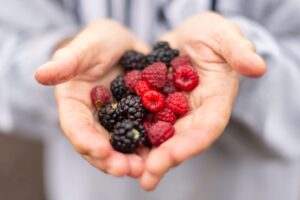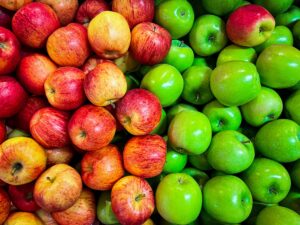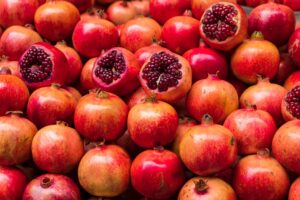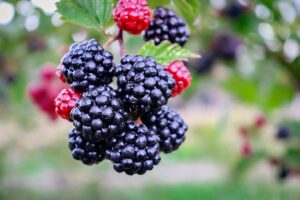
What are super fruits?
Although there isn’t a scientific description of what actually makes a fruit super, super fruits often contain unusual or exotic nutrients. In other words, super fruits are more likely to have an abundance of a particular vitamin or another nutrient we don’t usually include in our diets.
Super fruits tend to be rich in color and the color is where super nutrients like antioxidants reside. And antioxidants are substances that may protect your cells against free radicals. Free radicals are molecules produced when your body breaks down food or when you’re exposed to tobacco smoke or radiation. (Mayo Clinic)
Many exceptional super fruits grow in other countries and unfortunately aren’t available at the grocery or Farmer’s Market. So you may want to try growing at home so you can consume them at peak ripeness. But what if you can’t grow them on your own or don’t like the taste? Fortunately, there are many super fruit supplements you can purchase.
Super Fruits with super benefits
The super fruits we are discussing today have been researched and touted for their potential cancer fighting/prevention benefits. And fortunately for us, they can be purchased at our local grocery stores. Here are just a few of the many super fruits out there:
Berries
Berries are my favorite super fruits. Perhaps because they cleverly disguise themselves as yummy desserts. Blueberry pies, blackberry cobblers, and strawberry milkshakes are among my favorite treats. And raspberries taste like candy to me!
So yes, the added crusts and creams to these super fruits may not be weight-loss friendly. But the berries themselves are always heroes.
Blackberries have been shown to enhance the treatment effects of Herceptin in HER2+ breast cancer cells. And blueberries have been shown to prevent the growth of breast cancer tumors in mice. (Food For Breast Cancer)
Raspberries are another one of the super fruits associated with anti-cancer research. In fact, ellagic acid, a compound found in raspberries, has been found to increase the sensitivity of breast cancer cells to radiation while reducing damage to normal cells. Furthermore, studies show that black raspberries appear to have higher levels of chemo preventive micronutrients than red raspberries. (Food For Breast Cancer)
And last but definitely not least on our list of berries is the ever popular strawberry. In part because there is an ever-growing body of scientific evidence on strawberries suggesting its potential to influence the genes that govern cancer development. Stay tuned! (American Institute For Cancer Research)
An apple a day…
Apples (another dessert superhero) contain polyphenols that have promising anticancer properties. Polyphenols are plant-based compounds that may prevent inflammation, cardiovascular disease, and infections. In addition, some research suggests that polyphenols may modulate certain processes that can lead to cancer development. In fact, one study suggests that apple phloretin inhibits the growth of breast cancer cells while not affecting healthy cells.
{ANOTHER POST YOU MIGHT LIKE: 21 Inspiring Atomic Habit Quotes }
Papayas
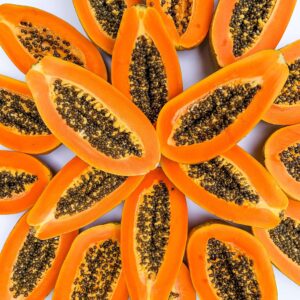
“The fruit, seeds, or leaves extracts of papaya have been shown to possess cytotoxic and anti-proliferative activities for a number of cancer cells lines including breast, liver, cervical carcinoma, lung adenocarcinoma, oral squamous cell carcinoma, pancreatic epithelioid carcinoma, mesothelioma, T cell lymphoma, plasma cell leukemia, Burrkitt’s lymphoma, anaplastic large cell lymphoma, and human promyelocytic leukemia.” (Journal of Cancer Metastasis and Treatment)
Make sure you are losing fat (not muscle) from the right places.
Get the arboleaf Smart Scale and Smart Measuring tape today!
Pomegranate
Pomegranates may be one of the least familiar super fruits on our list. A pomegranate has a thick, red inedible skin. After cutting the pomegranate open, you can pull apart the inner skin to find beautiful red seeds containing a sweet yet tart juice. (You may want to pull the skin apart over a bowl to capture every drop.) The seeds can be juiced or eaten whole or sprinkled into salads, cereal, etc. The antioxidants in pomegranate can help prevent your artery walls from thickening and lower the buildup of cholesterol and plaque.
In addition, “pomegranate has been shown to reduce existing cancer cell growth, induce cell death, prevent blood vessel growth associated with tumors, and inhibit the spread of cancer cells in the body. Pomegranate shows promise to help combat some of the most common types of cancer and may potentially boost the effectiveness of existing cancer chemotherapy treatments. Individuals concerned about cancer may want to consider adding a pomegranate extract (standardized to 30% punicalagins and 22% punicic acid) to their supplement regimen.” (Life Extension)
Super fruits are more than a low-calorie substitute
We’ve all heard that it’s good to substitute fruit in place of a processed cookie or other treat. But I want to suggest to you today to be sure and include fruit in your diet even if you’re eating the not-so-good stuff too. Because fruits contain things our bodies need whether we are “eating right” or not. So next time you’re at the grocery store, be sure to add fruits of varying colors to your cart and benefit from nature’s pharmacy. 🙂 All the best to you!
Women Who Fast content is only for informational purposes only. It is not intended for health or medical advice. It does not take the place of health or medical advice or treatment from a physician. Readers should consult their own doctor or a qualified healthcare professional for specific health concerns or questions. The information provided in this article is to be used by users at their own risk.

